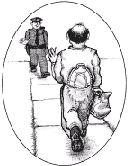 Fast
Eddie was a successful recycler of luxury items until one evening in 1988, when
he was nabbed with eight place settings of silver in his gym bag and a tea tray
stuffed down the back of his Nike sweatpants.
Fast
Eddie was a successful recycler of luxury items until one evening in 1988, when
he was nabbed with eight place settings of silver in his gym bag and a tea tray
stuffed down the back of his Nike sweatpants.
 Fast
Eddie was a successful recycler of luxury items until one evening in 1988, when
he was nabbed with eight place settings of silver in his gym bag and a tea tray
stuffed down the back of his Nike sweatpants.
Fast
Eddie was a successful recycler of luxury items until one evening in 1988, when
he was nabbed with eight place settings of silver in his gym bag and a tea tray
stuffed down the back of his Nike sweatpants.
"You always want to wear a good brand of clothing. It cuts down on the suspicion factor," Eddie explained.
In fact, Eddie loves explaining the fine points of the B&E (breaking and entering) trade even though, as he takes pains to point out, he's retired. Recently, we joined him in the basement of the Episcopal church where he's been a custodian since he got out of prison. There, amid cleaning supplies and stacks of hymnals, he gave us his take on home security.
"A good burglar, you see, is a student of the human species," Eddie said. "You get to know people by walking around neighborhoods, looking at stuff. You learn an awful lot that way. You see computer boxes or stereo boxes sitting out there on garbage day—bingo! Somebody got new toys. Lots of liquor bottles—they're big partyers and probably heavy sleepers. And people who leave tools and stuff lying out in the yard day after day, good chance they're slack about locking their doors."
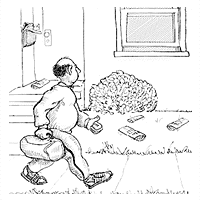 "But
the main thing you notice is whether they're home or not," he continued. "If
there's newspapers all over the place, mail stuffed in the box and blinds down
during the day, they're not home. Unless they like to sit in the dark, that is.
"But
the main thing you notice is whether they're home or not," he continued. "If
there's newspapers all over the place, mail stuffed in the box and blinds down
during the day, they're not home. Unless they like to sit in the dark, that is.
"Now, the kind of professional like I was, he wants to stay in business. Doesn't want any hassles, wants to get in and out fast. If there's a dog or a dinger [house alarm], he goes elsewhere. And he works during the day. Nighttime stuff is too dangerous. Somebody's laptop is not worth dying over." (Eddie was typical: Police estimate that 60 percent of all burglaries take place during the day, most before noon.)
"So you go where it's easy," he said. "Dingers don't keep anybody out of a house, really, but I'd rather skip any place that had one. Some guys don't care, though—can you believe they watch TV in the place they're hitting? Or they make a sandwich! But even with an alarm, it takes the cops 10, 15 minutes to get there. You leave the door open, and I'm in and out in five.
"Same thing with those lights [motion-sensing security lights]. They're fine if they're up high enough, but half the time I could just reach up and unscrew the bulbs. I'll say it again: all that high-tech stuff doesn't do squat if the doors and windows are easy."
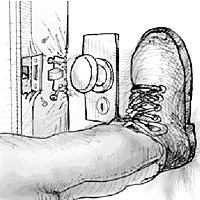 Eddie
went on at great length about human folly and burglary methods, but he also had
some concrete suggestions about easy, inexpensive ways to make your home safer.
So here, with Eddie's blessings, are seven tips on home security.
Eddie
went on at great length about human folly and burglary methods, but he also had
some concrete suggestions about easy, inexpensive ways to make your home safer.
So here, with Eddie's blessings, are seven tips on home security.
1. Lock up. Almost half of all burglars enter through an unlocked door or window. Bathroom and kitchen windows are most often left unlocked, because people open them to let out moisture and then forget to close them.
2. Make sure every exterior door has a deadbolt lock. Entry locksets are ineffective ("A joke!" said Eddie) because most have only a short, spring-loaded latchbolt. With a flat bar, a burglar can easily pry a door far enough away from its jamb to pop the latchbolt. Eddie preferred "loiding" a door, using a plastic credit card ("celluloid" was an early type of plastic) to trip the latch and open the door. Other, less artful B&E men just kick the door open, often shattering the lock mechanism and the door jamb.
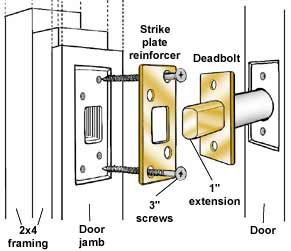 A deadbolt with a 1-inch throw, however, is an
effective way to keep burglars at bay, especially when combined with a strike
plate reinforcer. Most strike plate reinforcers come with 3-inch screws so you
can sink them into the framing behind the door jamb. That, coupled with a sturdy
deadbolt, will shorten the shin of any burglar who tries to kick his way in.
A deadbolt with a 1-inch throw, however, is an
effective way to keep burglars at bay, especially when combined with a strike
plate reinforcer. Most strike plate reinforcers come with 3-inch screws so you
can sink them into the framing behind the door jamb. That, coupled with a sturdy
deadbolt, will shorten the shin of any burglar who tries to kick his way in.
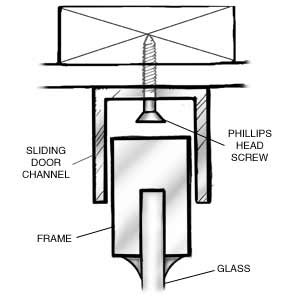 3. Secure sliding doors. Sliding doors ("God's gift
to burglars," Eddie said) should never be left partly open, even with a rod or
lock in place to block them. Here's why: To install most sliding doors or
windows, you lift them into the upper channel and then lower them into the
running channel below. And that's their chief weakness. If such doors are not
fully closed and locked, burglars can use the same technique to pry the sliding
door up and pop it out of the channel.
3. Secure sliding doors. Sliding doors ("God's gift
to burglars," Eddie said) should never be left partly open, even with a rod or
lock in place to block them. Here's why: To install most sliding doors or
windows, you lift them into the upper channel and then lower them into the
running channel below. And that's their chief weakness. If such doors are not
fully closed and locked, burglars can use the same technique to pry the sliding
door up and pop it out of the channel.
The remedy: Slide the door fully open and screw three equally spaced 2-inch screws into the top channel as shown. Because the channel is often metal, you'll need to predrill holes through it. Sink each screw so that about 3/4 inch protrudes down into the channel. Then adjust the screws so the door can slide freely but can't be pried up over the bottom channel.
5. Keep your garage door locked. Once a burglar's out of sight in your garage, he can take all the time he likes to get into your house. And homeowners frequently forget to lock the door into the garage.
6. Consider a security system. Motion-sensing security lights and alarm systems are surprisingly affordable these days. They help discourage burglars from trying your house. Burglars, like water, follow the path of least resistance.
7. Use common sense. Keep bushes trimmed back from your house so burglars can't find shelter from view. Don't leave ladders lying around outside; a burglar could use one to enter a second-story window. Before you go away, ask neighbors to park their car in your driveway and pick up your mail and newspapers. Put lights and radios on timers, so it looks like somebody's home. And never leave cheerful messages on your answering machine announcing that you're in Maui for a week. The burglar's best friend, as Eddie would say, is human nature.
Speaking of which, we asked Eddie if he ever missed his former trade. "Nah," he said. "There's no pride anymore. It's all junkies and blasters. They won't take 15 seconds to loid open a door—everything's bash and run. They got no respect for people's property."
Copyright © 2006 - All rights reserved.